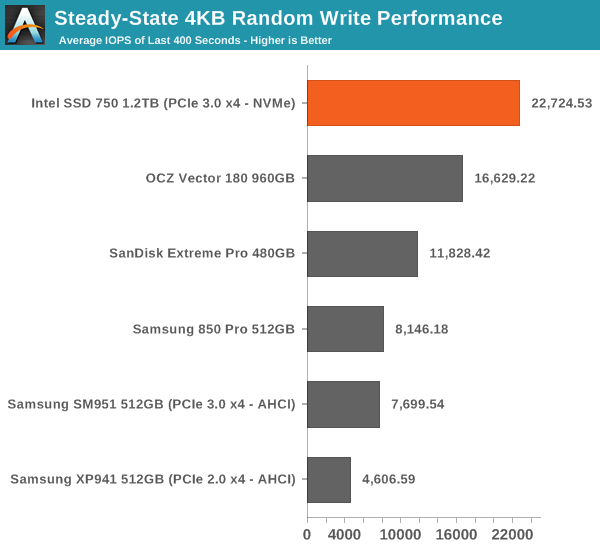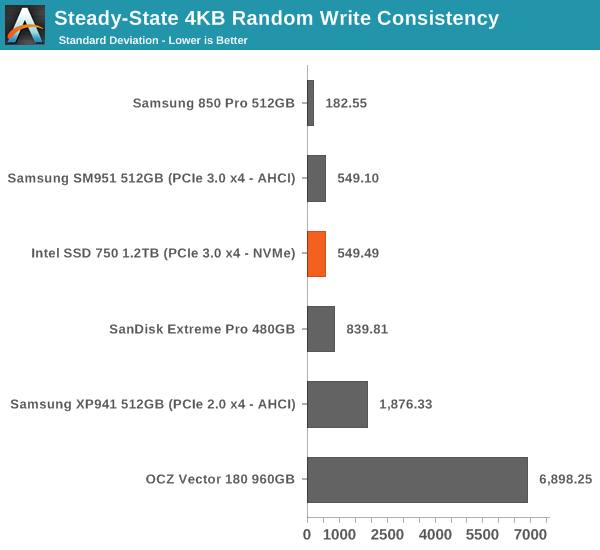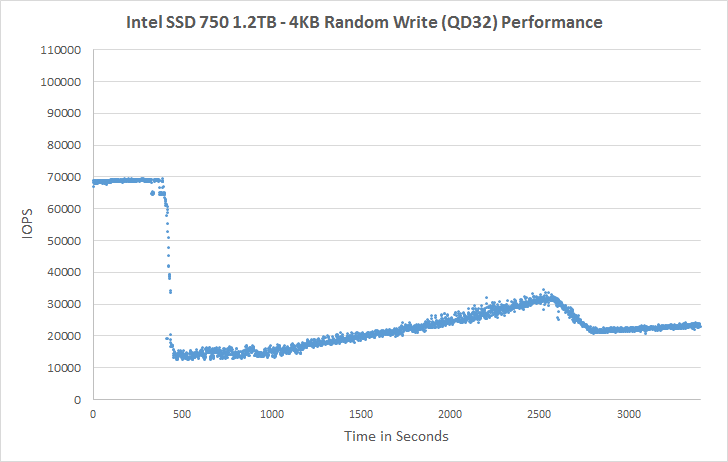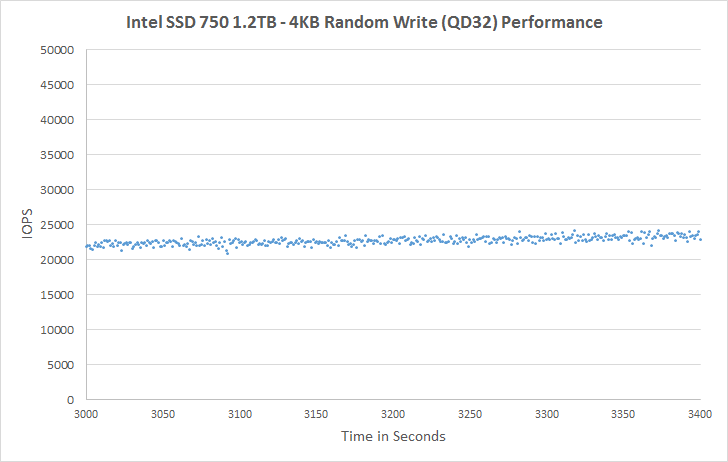Intel SSD 750 PCIe SSD Review: NVMe for the Client
by Kristian Vättö on April 2, 2015 12:00 PM ESTPerformance Consistency
We've been looking at performance consistency since the Intel SSD DC S3700 review in late 2012 and it has become one of the cornerstones of our SSD reviews. Back in the days many SSD vendors were only focusing on high peak performance, which unfortunately came at the cost of sustained performance. In other words, the drives would push high IOPS in certain synthetic scenarios to provide nice marketing numbers, but as soon as you pushed the drive for more than a few minutes you could easily run into hiccups caused by poor performance consistency.
Once we started exploring IO consistency, nearly all SSD manufacturers made a move to improve consistency and for the 2015 suite, I haven't made any significant changes to the methodology we use to test IO consistency. The biggest change is the move from VDBench to Iometer 1.1.0 as the benchmarking software and I've also extended the test from 2000 seconds to a full hour to ensure that all drives hit steady-state during the test.
For better readability, I now provide bar graphs with the first one being an average IOPS of the last 400 seconds and the second graph displaying the standard deviation during the same period. Average IOPS provides a quick look into overall performance, but it can easily hide bad consistency, so looking at standard deviation is necessary for a complete look into consistency.
I'm still providing the same scatter graphs too, of course. However, I decided to dump the logarithmic graphs and go linear-only since logarithmic graphs aren't as accurate and can be hard to interpret for those who aren't familiar with them. I provide two graphs: one that includes the whole duration of the test and another that focuses on the last 400 seconds of the test to get a better scope into steady-state performance.

Given the higher over-provisioning and an enterprise-oriented controller, it's no surprise that the SSD 750 has excellent steady-state random write performance.

The consistency is also very good, although the SSD 750 can't beat the 850 Pro if just focusing on consistency. When considering that the SSD 750 provides nearly three times the performance, it's clear that the SSD 750 is better out of the two.
 |
|||||||||
| Default | |||||||||
At the initial cliff the performance drops to around 15K IOPS, but it quickly rises and seems to even out at about 22-23K IOPS. It actually takes nearly an hour for the SSD 750 to reach steady-state, which isn't uncommon for such a large drive but it's still notable.
I couldn't run tests with added over-provisioning because NVMe drives don't support the usual ATA commands that I use to limit the LBA of the drive. There is similar command set for NVMe as well, but I'm still trying to figure out how to use them as there's isn't too much public info about NVMe tools.
 |
|||||||||
| Default | |||||||||










132 Comments
View All Comments
p1esk - Friday, April 3, 2015 - link
Let me say that again: this is a consumer drive. That's why it is so cheap compared to 3700. A large Hollywood production company will surely be able to afford enough of these drives not to worry about exceeding 128TB write limits.emn13 - Saturday, April 4, 2015 - link
I'm sure they can afford it - but why pay more than necessary? Compared to the competition, this is an unusally low write endurace for such a high-end drive. Take a peek at say the 1TB 850 Pro; that's likely to be considerably cheaper (and perhaps more deserving of the "consumer" monniker), and it's NAND is rated for a little more than 6000TB of (raw) writes.128TB? That's really, really unusual for a drive like this.
earl colby pottinger - Tuesday, April 7, 2015 - link
Because that is how you run your company out of business by being cheap of key hardware.If you are producing enough 4K video to stress this drive, you are producing enough video that the cost of production is way greater that the cost of drives that you don't have to worry about this type of failure.
I have seen tons of companies go out of business or lose out on thousands of dollars in sales because they tried to save a few hundred dollars up-front against my advice.
Stop looking for cheap solutions if the storage is critical to the running of your business.
emn13 - Saturday, April 4, 2015 - link
I do a lot of large-file snapshot/restore stuff, and I definitely write a lot more than 70gb a day. Intel's own consumer level 335 was rated for 700TB, and that was a much smaller drive. More specifically, this hasn't been a problem on other drives - neither on ssd's, nor on hdds. While it's conceivable there are more efficient ways of working from the perspective of the drive, that's a hassle to arrange.Perhaps it's worth pointing you to the SSD endurance experiment: http://techreport.com/review/26523/the-ssd-enduran...
All of these drives approximately 240GB drives survived at least 700gb, and it was specifically the intel that seemingly intentionally bricked itself then.
This drive is 5 time larger, and is rated for a fraction of that. This is pretty unreasonable to my mind.
darkgreen - Thursday, April 2, 2015 - link
This part of the review made be curse:"...with the X25-M. It wasn't the first SSD on the market, but it was the first drive that delivered the aspects we now take for granted: high, consistent and reliable performance."
Arrrgh...
I was one of the early adopters who paid a ton for the XM-25. If you go back through the archives, though, you'll see Intel's XM-25 had a fragmentation bug that made it slower than a spinning platter hard drive after a bit of use. I was in that situation. Intel released a "fix" based on a script run on some old freeware, but they didn't support the fix *at all* and for many people (including me) it would never work.
So INTEL's "high, consistent and reliable performance" turned out to be total crap. I paid over $400 for what turned out to be a doorstop and had to replace it with a Corsair SSD a short time later. INTEL never offered a refund, support, or even an apology to all the people they had sold a totally nonfunctional product to. I still have that drive in my electronic junk pile and I curse INTEL every time it catches my eye.
I'm waiting for good PCIe SSD before my next PC build, unfortunately I would say INTEL products don't count because in the past we've seen (inarguably, and documented on this very site!) that they mass release buggy products and if you happen to have bought one you're just hung out to dry when they turn out to have had major design errors.
Ugh. at least mention the history here and caution people instead of suggesting Intel is reliable.
Makaveli - Thursday, April 2, 2015 - link
anecdotal evidence!!I've have two G2 160GB intel drives in Raid 0 for a couple years now and they been solid no issues.
So I disagree with your post do I win ?
darkgreen - Friday, April 3, 2015 - link
I wasn't expected that kind of reply. Google "intel replicated SSD firmware problem" (without the quotes) and you can read about the various things that happened, many of which were first reported at this very site, but I guess it WAS 6 years ago so I shouldn't expect everyone to know about it.I was running win 7 64-bit and had a G1. You'll see reports that ALL G1's had a fragmentation issue that made them slower than spinning platters after a bit of use, and you'll see mainstream media reports about how the "fix" instead bricked drives for many users on win 7 64-bit .
Not anecdotes, mainstream reporting and I was one of the thousands affected and can confirm that even after those reports Intel did nothing for non-enterprise users but delete the 50-page thread on their support site.
Kristian Vättö - Thursday, April 2, 2015 - link
To put it frankly, there's no SSD (or HDD) manufacturer that hasn't had any issues, so you might as well go back to the good ol' pen&paper if you want something truly reliable ;-)Raniz - Thursday, April 2, 2015 - link
Until the pen explodes and you have to buy a new shirtdarkgreen - Friday, April 3, 2015 - link
Agreed. In coming up with a good google search for the guy above who apparently hadn't heard about this I encountered a lot of articles about necessary firmware updates for other vendors as well. All I know is that Intel left consumers without options or replacements, I don't know what happened in all those other cases. I suppose it's a good reason to think about how important the storage division is to any company you buy from, though. Intel might, conceptually, want to support SSDs but I'd imagine all the management focus is on enterprise and processors. So who do you go with? OCZ (yikes! but maybe okay after the buyout?) Any thoughts on which companies actually value consumer purchases of their SSDs as "mission-critical" ?